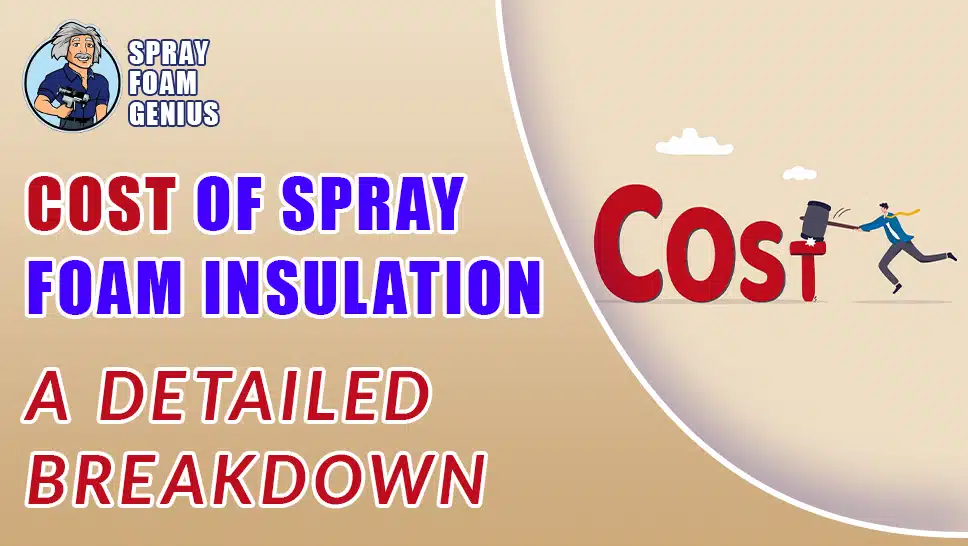
Spray Foam Genius Marketing specializes in optimizing the online presence of spray foam insulation contractors. Our expertise encompasses Professional SEO, Google Business Profile Optimization, Local SEO, Website Development, Lead Generation, Social Media Marketing, and Reputation Management tailored exclusively for spray foam insulation professionals in the USA and Canada. This guide is designed to provide you with a comprehensive understanding of the costs associated with spray foam insulation, enabling you to make well-informed decisions for your projects and enhance your business’s value proposition.
Understanding Spray Foam Insulation
Spray foam insulation has become a popular choice for both residential and commercial properties due to its superior thermal insulation and air-sealing properties. The insulation process involves spraying a liquid foam that expands and hardens, creating a solid barrier against heat and airflow. Here’s a quick overview of the types of spray foam insulation:
Open-Cell Spray Foam
Open-cell spray foam is lighter and less dense compared to closed-cell foam. It has a lower R-value per inch, which makes it suitable for interior spaces where moisture resistance is less critical. Open-cell foam expands significantly upon application, filling gaps and voids, which helps with air sealing.
Closed-Cell Spray Foam
Closed-cell spray foam is denser and more rigid. It provides a higher R-value per inch and offers excellent moisture resistance, making it ideal for areas prone to high humidity or where additional structural strength is needed. The closed-cell foam also contributes to better soundproofing compared to open-cell foam.
Factors Influencing Spray Foam Insulation Costs
The cost of spray foam insulation can vary based on several factors. Understanding these factors will help you estimate costs more accurately and provide better quotes to your clients.
Type of Foam
The choice between open-cell and closed-cell foam significantly impacts the overall cost. Closed-cell foam is generally more expensive due to its higher R-value and moisture-resistant properties. Here’s a rough comparison of costs:
- Open-Cell Foam: $0.44 to $0.65 per board foot.
- Closed-Cell Foam: $0.90 to $1.50 per board foot.
Application Area
The size and complexity of the area to be insulated play a crucial role in determining the cost. Larger areas or those with complicated designs may require more materials and labor. For example, insulating a large attic will typically cost more than insulating a small wall.
Thickness of Insulation
The R-value of spray foam insulation is directly related to its thickness. The greater thickness provides better insulation but also increases costs. Typical thickness ranges from 2 to 6 inches, depending on the desired R-value and specific requirements of the project.
Location and Accessibility
The geographical location and accessibility of the area being insulated can affect the cost. Areas that are difficult to reach or require special equipment for application may incur higher labor costs. For instance, insulating a crawl space or a high ceiling might require additional safety measures and equipment.
Preparation and Cleanup
Before applying spray foam, surfaces often need preparation, such as cleaning or removing old insulation. Post-application cleanup and any necessary repairs also contribute to the overall cost. Proper preparation and cleanup ensure optimal adhesion and performance of the insulation.
Detailed Cost Breakdown
Understanding the cost components involved in a spray foam insulation project can help you provide accurate estimates and plan your budget effectively.
Material Costs
The material cost is a significant portion of the total expense. Here’s a breakdown of the typical costs for spray foam materials:
- Open-Cell Spray Foam: $0.44 to $0.65 per board foot.
- Closed-Cell Spray Foam: $0.90 to $1.50 per board foot.
For a 1,000-square-foot area with 3 inches of spray foam:
- Open-Cell Foam: Material cost ranges from $1,320 to $1,950.
- Closed-Cell Foam: Material cost ranges from $2,700 to $4,500.
Labor Costs
Labor costs vary based on location, complexity of the job, and experience of the installers. On average, labor may cost between $0.50 and $1.00 per board foot. For a 1,000-square-foot area with 3 inches of foam:
- Labor Cost: Approximately $1,500 to $3,000.
Additional Costs
Several additional costs can affect the total project expense:
- Preparation and Cleanup: Costs for preparing surfaces and cleaning up can range from $200 to $1,000.
- Equipment Rental: If special equipment is needed for access or application, rental costs might add another $100 to $500.
- Miscellaneous Costs: These can include permits, insurance, and any unexpected expenses that may arise during the project.
Total Project Cost
Combining material, labor, and additional costs, a typical spray foam insulation project for a 1,000-square-foot area can range from $3,000 to $8,500. The total cost will depend on the type of foam used, the complexity of the job, and other project-specific factors.
Cost-Effectiveness and Long-Term Savings

While the initial cost of spray foam insulation may be higher than traditional insulation methods, the long-term benefits often outweigh the upfront expense. Here’s how spray foam insulation proves to be a cost-effective choice:
Energy Efficiency
Spray foam insulation provides a high R-value, which translates to better energy efficiency. By minimizing heat transfer and reducing air leaks, spray foam helps lower heating and cooling costs. This leads to significant savings on utility bills over time.
Air Sealing
One of the key advantages of spray foam insulation is its ability to create an effective air seal. By filling gaps and cracks, spray foam reduces drafts and improves indoor air quality. This can enhance comfort and contribute to a healthier living environment.
Moisture Resistance
Closed-cell spray foam offers excellent moisture resistance, helping to prevent mold and mildew growth. This is particularly important in areas with high humidity or potential water exposure, such as basements and crawl spaces.
Longevity
Spray foam insulation is known for its durability and long lifespan. Unlike traditional insulation materials that may settle or degrade over time, spray foam maintains its performance and effectiveness for many years. This means fewer replacements and repairs, adding to its overall cost-effectiveness.
Tips for Managing Spray Foam Insulation Costs
To maximize the benefits of spray foam insulation while managing costs, consider the following tips:
Obtain Multiple Quotes
Get quotes from several insulation contractors to compare prices and services. Ensure that each quote includes a detailed breakdown of material, labor, and additional costs.
Choose the Right Type of Foam
Select the type of spray foam that best fits your project needs. Open-cell foam is suitable for interior applications with less moisture exposure, while closed-cell foam is ideal for areas requiring higher insulation and moisture resistance.
Plan for Preparation and Cleanup
Factor in preparation and cleanup costs when budgeting for your project. Proper preparation ensures optimal insulation performance and minimizes the risk of additional expenses.
Invest in Quality
While it may be tempting to choose the lowest bid, investing in quality materials and experienced contractors can pay off in the long run. High-quality spray foam and skilled installers can ensure better performance and longevity.
How Spray Foam Genius Marketing Can Help
For spray foam insulation contractors, having a solid online presence is crucial for attracting clients and growing your business. Spray Foam Genius Marketing is dedicated to helping you enhance your digital footprint and generate leads through our specialized services.
Our Services Include:
- Professional SEO: Improve your website’s search engine ranking to attract more traffic and potential clients.
- Google Business Profile Optimization: Enhance your visibility on Google Maps and local search results.
- Local SEO: Target clients in your specific geographic area to increase local business opportunities.
- Website Development: Create a professional, user-friendly website that showcases your services and expertise.
- Lead Generation: Implement strategies to generate high-quality leads and grow your client base.
- Social Media Marketing: Engage with potential clients and build your brand through effective social media strategies.
- Reputation Management: Monitor and manage your online reputation to build trust and credibility with potential clients.
Ready to take your spray foam insulation business to the next level? Contact us today to learn how we can help you optimize your online presence and achieve your business goals.
Call us at 877-840-FOAM for USA and 844-741-FOAM for Canada visit our website at sprayfoamgeniusmarketing.com, or email us at [email protected] to get started.
Let us help you enhance your business and stand out in the competitive spray foam insulation market. Reach out to us today!
- 5 Google My Business Hacks to Double Your Leads for Spray Foam Insulation Contractors - January 14, 2025
- Why Spray Foam Contractors Cannot Ignore Reputation Management in 2025 - January 13, 2025
- Local SEO Secrets Every Spray Foam Contractor Must Know to Win in 2025 - January 13, 2025

